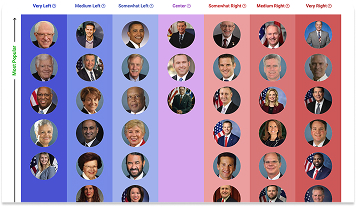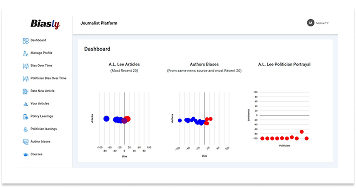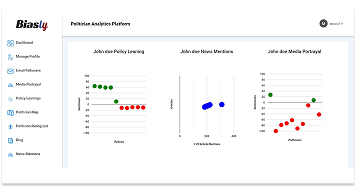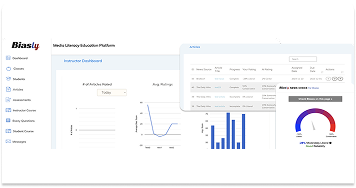-30% Somewhat Left
Bias Meter
Extremely
Liberal
Very
Liberal
Somewhat Liberal
Center
Somewhat Conservative
Very
Conservative
Extremely
Conservative
-100%
Liberal
100%
Conservative

Biasly determines media bias ratings through a dual-layered approach combining artificial intelligence and analyst review. The platform’s proprietary bias detection engine, Bias Meter, evaluates sentiment, policy position alignment, and language framing across thousands of data points in news articles. Analysts then verify and interpret the AI’s findings, providing additional context where needed. Learn more about ratings
- Profile
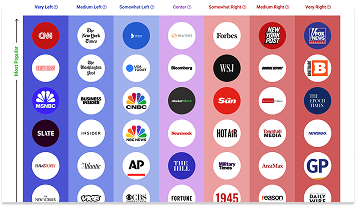
Al Jazeera on the media bias chart
Al Jazeera has a Bias Score of -30% Somewhat Left which is based on a variety of factors including its policy and politician leanings, article ratings, and the use of biased language. Its Reliability is rated as Good, and additional analytical insights are available in the other tabs.
- Bias Rating
-30% Somewhat Left
- Reliability75% Reliable GoodPolicy Leanings
-18% Somewhat Left
Extremely
LiberalVery
LiberalModerately
LiberalSomewhat Liberal
Center
Somewhat Conservative
Moderately
ConservativeVery
ConservativeExtremely
Conservative-100%
Liberal100%
Conservative
Average Reliability
*Our bias meter rating uses data science including sentiment analysis, machine learning and our proprietary algorithm for determining biases in news articles. Bias scores are on a scale of -100% to 100% with higher negative scores being more liberal and higher positive scores being more conservative and 0% being neutral. The rating is an independent analysis and is not affiliated nor sponsored by the news source or any other organization.
Politician Portrayal50% negative
Continue For Free
Create your free account to see the in-depth bias analytics and more.
By creating an account, you agree to our Terms and Privacy Policy, and subscribe to email updates.
Log In
Log in to your account to see the in-depth bias analytics and more.
Policy Leanings Analysis
Policy | Bias score |
|---|
Al Jazeera Editorial Patterns
Al Jazeera’s coverage of political topics often reflects a Somewhat Left bias, with consistent patterns in phrasing, source selection, and thematic focus that lean Somewhat Left. While the publication demonstrates journalistic standards in many of its reports, the choice of issues, framing, and word usage can indicate a political slant. This content analysis examines how Al Jazeera handles liberal and conservative issues and evaluates its language choices and editorial tendencies.
Coverage of Liberal vs. Conservative Topics
Al Jazeera covers a wide range of topics internationally. They generally provide a similar amount of coverage of Liberal and Conservative topics. However, they provide extensive coverage of the Trump Administration, more so than they did of the Biden Administration during former President Biden’s term.
However, Al Jazeera does not extensively cover social issues in the same way it does with other issues. Al Jazeera does have a section dedicated to LGBTQ+ rights news, but it is infrequently updated. The same goes for DEI, but it is better covered compared to LGBTQ+ rights. Often, they are less critical of left-leaning topics than of conservative topics.
They provide extensive coverage of the Trump administration’s actions. Many of the articles cover policies or debates in Congress. Generally, they are more critical of the conservative bills. Other controversial topics are covered, such as the files relating to Jefferey Epstein. Al Jazeera generally takes a critical stance
Policy and Issue Framing
Al Jazeera does a decent job of covering a variety of topics. They will often give equal coverage of left-leaning and right-leaning topics. However, Al Jazeera may sometimes provide biased coverage of these topics.
When discussing the Israel-Palestine conflict, they will take a sympathetic view towards Palestinians. They highlight starvation in Gaza, placing the blame directly on Israel for its strikes and blockade. They share photos of Gazans in horrible conditions, emphasizing humanitarian concerns.
When discussing Donald Trump, they will often take a critical stance. When talking about an action from Trump that they agree with, they might also bring up negatives or other shortcomings. One such example is this article, explaining the recently declassified files about the assassination of Martin Luther King Jr. While they acknowledge the declassification, they immediately wonder why he hasn’t done the same for the Jeffrey Epstein files. Trump’s refusal to declassify the Epstein files has been a point of contention.
Coverage and Relevance
Al Jazeera often covers many key issues in the US, but primarily on a surface level. However, they emphasize their focus on global politics. Thus, they do not often cover many issues in the US that would be covered by primarily US news sources.
Readers who wish to further explore how Al Jazeera compares with other publications can visit Biasly’s Media Bias Chart to analyze tone and word choice in real time.
Al Jazeera Bias Analysis
Al Jazeera prides itself on being the first independent news source in the Arab world. It has built a reputation for reliable reporting on a global scale. However, they face some pushback regarding their bias. Some have expressed concern with their direct connection to the ruling family of Qatar.
Al Jazeera’s national origins are also frequently brought up. Americans may be less inclined to trust a source that does not originate from America. This can be seen in the Council on Foreign Relations’ article about Al Jazeera’s origins. They outwardly claim that Al Jazeera is a “voice of Qatar’s regime.”
The author claims that this was a common viewpoint in the executive branch during George W. Bush’s presidency. The author references his time working at the White House as proof of this. He claims that he and the other workers “believed Al Jazeera broadcasting was inciting violence against American troops in Iraq and was costing American lives with its biased coverage.”
According to a poll from YouGov, more people distrust Al Jazeera than trust it. But where does this distrust come from? Is this distrust due to bias, or for other reasons?
Biasly synthesizes AI and analyst review to determine their lean and to what level that lean exists. We analyze articles and editorial patterns from Al Jazeera to create the best rating we can. In this article, we will analyze Al Jazeera for such tendencies.
Is Al Jazeera Biased?
Based on Biasly’s evaluations, Al Jazeera is rated as Somewhat Left.
By examining content patterns and the broader context of media influence, we aim to offer a balanced perspective on Al Jazeera’s political bias—and contribute to the ongoing discussion about bias in the news.
How Does Biasly Rate News Sources?
Biasly uses proprietary algorithms and a team of analysts to provide comprehensive bias evaluations across thousands of news outlets. Over 200,000 articles from more than 3,200 sources have been analyzed to identify the most accurate and unbiased stories.
Biasly assigns each outlet three key scores:
- Reliability Score – Reflects factual accuracy
- AI Bias Score – Generated via natural language processing
- Analyst Bias Score – Assessed by human political analysts
These scores are based on seven core metrics: Tone, Tendency, Diction, Author Check, Selection/Omission, Expediency Bias, and Accuracy. These elements help analysts and algorithms evaluate the political attitude conveyed by each article.
Biasly’s Bias Meter ranges from -100% (most left) to +100% (most right), with 0% indicating neutrality. The system evaluates individual articles based on political terms, policies, figures, and sentiment to calculate precise bias ratings.
Is Al Jazeera Politically Biased?
Al Jazeera earns a Somewhat Left rating for its AI Bias Score. The Analyst Bias Score, Somewhat Left, is generated by reviewers from liberal, moderate, and conservative backgrounds. Analysts reviewed 15 Al Jazeera articles and noted preferences in areas like coverage of liberal politicians and policy topics such as abortion rights and clean energy. However, the paper maintained objectivity on topics like education and national security.
Al Jazeera, being a Middle East-based news organization, may have some inherently liberal leaning ideologies on foreign relations. These could take form in pro-Palestine support, support for increased foreign aid, or the preservation of NATO. But that might not necessarily be the case for many progressive social issues. Most notably, issues such as LGBTQ+ rights.
Al Jazeera does not officially identify as an Islamic news organization. However, it must be noted that much of the leadership is Muslim, and they are based in Qatar, and Muslim majority country. This may impact their article, making it more likely to be published based on their viewership’s beliefs. A Pew Research poll found that the majority of Muslims believe that ‘homosexuality should be discouraged.’
Their articles do not use a socially conservative language, but their lack of coverage of events might imply bias. For example, on August 1st, 2025, a coalition of sixteen states sued the Trump Administration. An NPR article quoted the lawsuit, which argues that the Trump Administration is “running a cruel and targeted harassment campaign against providers who offer lawful, lifesaving care to children. Other significant news organizations covered the situation. CNN published an article, NBC published an article, and The Guardian published an article covering this topic. Al Jazeera did not cover this topic, despite being covered by other significant news organizations. So, despite their liberal foreign policy lean, they might be socially conservative.
However, Al Jazeera could reasonably argue that Islam is not a part of their core beliefs. They also feature non-Muslim writers and news anchors.
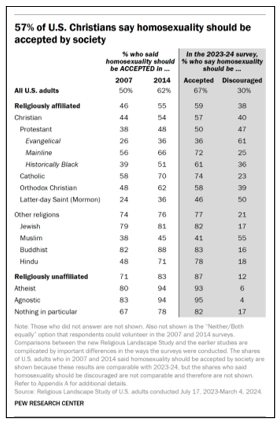
Source: Pew Research Center
Analysis of Bias in Al Jazeera Online Articles
Al Jazeera’s origins can call into question its credibility. Paired with not being from the United States while discussing American topics, many question Al Jazeera’s credibility. Therefore, we must ask, is Al Jazeera politically biased?
To evaluate this, we can analyze select Al Jazeera articles through several of Biasly’s bias rating criteria: Tone, Tendency, Author, Diction, and Expediency Bias.
- Tone: Emotions conveyed in the article
- Diction: Vocabulary used in the article
- Author: History and trend of the writer
- Tendency: Patterns or trends that the writer’s other works follow
- Expediency Bias: Images or phrases that are meant to catch the reader’s attention

Source: Al Jazeera
One example of experience bias can be found in this article. The article features images and infographics meant to instill emotion in the reader. The above image shows people crawling on trucks, trying to receive food, meant to instill an empathetic feeling from the reader. Later, infographics help the reader picture the point the author is trying to make. One infographic displays the death count of Gazans since the conflict’s ignition in 2023. It notably displays body bags next to each other, gradually shrinking, signifying children. Another uses the Burj Khalifa, the world’s tallest building, as a form of measurement for the dead. This is meant to solicit a horrid response from the reader.
This indicates a progressive lean in the article. According to a Gallup poll, Democrats are nearly 3x more likely to support Palestine over Israel. Thus, because the article takes a pro-Palestinian stance, it can be considered a left-leaning article.
That is further emphasized in the tone throughout the article. It focuses on the conditions that Gazans are going through and the mass starvation. It uses various sources to prove its point, using numbers to show the state of Gaza. These emotions are amplified in the subtitle of the article:
“The grim milestone comes as Israel continues to attack aid seekers amid famine conditions in Gaza, with at least 147 deaths directly attributed to starvation.”
By emphasizing the depressive tone, the article displays a left-leaning bias. It blames Israel for the starvation, drawing attention to reports about Israel allegedly laying traps for Gazans:
“Local accounts indicate that Israel used booby-trapped robots, as well as tanks and drones, in what residents describe as one of the bloodiest nights in recent weeks, said Al Jazeera’s Tareq Abu Azzoum, reporting from Deir el-Balah in central Gaza.”
The article points out that Israel seems to be breaking the ceasefire that was meant to allow humanitarian aid into the country. The tone indicates anti-Israel sentiment, meant to solicit a horrified response from the reader.
This is displayed best in the subheading “Babies particularly affected,” talking about starvation. This section uses quotes from doctors commenting on the situation. Particularly, some of the quotes describe the children as “just the skin over the bone,” and say that they “often die of heart failure.” This section on children, in particular, drives home the depressive and horrified tone. For the majority of people, children are the pinnacle of innocence. While one may willfully ignore famine among adults, it is difficult to do so with children.
This bias can also be seen in the specific word choices in the article. They use words like “grim,” “famine,” and “destitution” to describe the situation. These words indicate pro-Palestine support, which is generally a left-leaning belief. The article takes these words from international organizations, which can generally be trusted for factual reporting. Nevertheless, these words and sources are likely deliberate choices, meant to portray their narrative.
However, how does Al Jazeera fail in non-Middle East matters? This article detailing the impacts of Trump’s tariffs generally provides an unbiased look. However, there are some notable exceptions, such as the subtitle to the article, as an example of expediency bias. It shows a left-leaning bias, as it draws focus on increased prices and harm to industries. But it tries to lessen that bias by including how much tariff money it has made.
The majority of the article gives a neutral tone. It describes new tariffs and deals that were struck. However, some potential bias shows in some of the wording used, such as describing this new wave of tariffs as a “slew” of tariffs. Some sections, such as “Have prices increased?” and “Which sectors are expected to be hit the worst?” provide a slight left-leaning bias. Many of these sections use sources to say that prices will be increased, and there will be many harms as a result. While this does not necessarily mean a left-leaning bias, it still presents possible opposition to Trump’s tariffs.
Notably, factual reporting articles from Al Jazeera often do not include the writer’s name. This article, however, did name the writers as Marium Ali and Hanna Dugal. Hanna Dugal focuses more on the economy, writing multiple articles about Trump’s impact on the economy. She has also written articles about immigration, presenting a pro-immigrant, and thus left-leaning bias. Dugal does not have any significant social media presence.
Marium Ali often writes about many left-leaning topics. She has written articles about the Israeli invasion of Gaza from a pro-Palestine, thus left-leaning view. She has written an article on the environmental impact of air conditioners, a left-leaning topic. She has also written an article about Trump’s social media presence, a concern that is often brought up by left-leaning people. Ali does not have any significant social media presence.
Analysis of Al Jazeera Opinion Articles
To fully understand political bias in media, it’s important to distinguish between factual reporting and opinion pieces. Factual reporting reports on events and provides an unopinionated report on the events. The writer does not give their opinion on the events, besides sometimes making an educated prediction on what will happen next. Opinion pieces focus on the writer’s beliefs surrounding an event or ideology. These are purposefully biased and typically make an argument for or against something. In this section, we will be analyzing the latter, looking for forms of bias.
Many of Al Jazeera’s opinion articles are written by left-leaning authors. One such example is this open letter published in Al Jazeera’s opinion section. The article is unabashedly pro-Palestinian, and the authors consist of 58 former EU envoys and ambassadors. The letter unconditionally condemns Israel and calls for a ceasefire and expansive humanitarian aid to Gaza. Al Jazeera’s open publication of this letter may be representative of their political beliefs.
Other articles also follow this tendency. This opinion article was written by Tariq Mehmood, an author who immigrated to Britain. He was a part of the United Black Youth League, an anti-racist group in Bradford, United Kingdom, in the 1980s. The group focused on systemic racism and tried to defend their communities from racist attacks. Mehmood would later publish books that also display anti-racist and anti-imperialist sentiments.
This article is also an excellent example of expediency bias. The featured image is of anarchist demonstrators setting fire to objects and throwing trash cans. This is meant to show anti-immigrant demonstrators in a negative light, equating them with anarchy. The article title does a similar thing. “The UK is slipping into a racist dystopia” uses polarizing words such as “racist” and “dystopia.” This title is deliberate; the author could just as easily have used a more neutral headline to make their point. Using this headline makes the reader more interested in clicking, and also presents a left-leaning bias.

Source: Al Jazeera
Another article displays an anti-Trump tone and wording. This article immediately takes a stance against US President Donald J. Trump, stating that they intend to “defeat” him. The article quickly states their dislike of governments that have accepted Trump’s tariff terms.
“Governments have been falling over one another to offer concessions to United States President Donald Trump as his August 1 tariff deadline looms. On Sunday, the US president scored his biggest victory to date, as European Union chief Ursula von der Leyen, like the leader of a vassal state paying homage to an emperor, travelled to Trump’s private golf course in Scotland to offer him tribute.”
They use words such as “homage,” “vassal state,” and “tribute” to depict the leaders as submissive. They also use words such as “emperor” and later “dominance” and “bully” to describe Trump as a greedy authoritarian who pushes around the countries around him. The article’s outwardly disapproving tone, combined with the language used, displays an unmistakably left-leaning bias.
How to Evaluate Bias
Although Biasly rates Al Jazeera as Somewhat Left, it’s important to remember that bias can vary from article to article. Al Jazeera also covers a conservative-leaning state with objectivity on many issues, from state legislation to social developments. This complexity underscores the importance of examining each article individually. So, let’s learn how to evaluate media bias.
Recognizing media bias requires awareness and critical thinking. Often, readers trust news sources that affirm their existing beliefs—a psychological tendency known as confirmation bias. This makes it harder to identify slanted narratives or one-sided reporting.
To combat this, it’s essential to challenge your assumptions by consulting multiple viewpoints and verifying news through third-party analysis. Tools like Biasly’s media bias ratings allow readers to compare the same news story across the political spectrum.
Ultimately, bias isn’t always a matter of what is said—it’s also about what is left out, how topics are framed, and which stories are chosen for coverage. Learning to recognize these patterns can help readers make more informed decisions and develop greater media literacy.
To start comparing news outlets and gain a better understanding of bias, sign up for Biasly’s Media Bias & News Analytics Platform to see how stories vary between sources.
Al Jazeera Reliability Analysis
Is Al Jazeera Reliable?
At Biasly, we specialize in evaluating not just bias but also the reliability of media outlets. Their foreign origins might cause many Americans to distrust Al Jazeera. Part of this may be due to their origins as a Middle Eastern news source. This could be seen in the previously mentioned poll, which showed that the BBC, a British-owned news source, was trusted exponentially more than Al Jazeera.
But, is Al Jazeera reliable? In this section, we will explore whether Al Jazeera can be relied upon for accurate and factual reporting.
How to Evaluate Reliability?
Reliability refers to how trustworthy or accurate a news source is. If we can’t trust what we read, then continuing to consume content from that outlet serves little purpose. So how do we evaluate a news outlet’s reliability?
There are several potential measures of reliability to look out for when trying to determine whether a media source is reliable or not. Red flags for an unreliable article can include the presence of wild, unsubstantiated claims, facts dependent on other unreliable sources, heavy use of opinionated language, and more. In contrast, hallmarks of a reliable source include:
- Absence of subjective language
- Citing credible sources (e.g., .gov, .edu, academic references)
- Verifiable facts and statistics from multiple outlets
- Use of primary sources, like interviews or transcripts
- Consistency with coverage across other platforms
Biasly’s reliability scores incorporate these elements in evaluating media outlets.
So, How Does Al Jazeera Fare in Its Reliability?
The political reliability index developed by Biasly assesses both accuracy and trustworthiness. Al Jazeera currently holds Good Reliability Score, which is calculated as a weighted average of:
- Fact Analysis Score – Evaluates the accuracy of claims, facts, and evidence.
- Source Analysis Score – Assesses the number, diversity, and credibility of sources and quotes used.
Al Jazeera’s Source Analysis Score is rated Average at 33% Reliable. This suggests moderate trustworthiness in its sourcing practices. The score is AI-generated and considers quote length, frequency, diversity, and quality.
The Fact Analysis Score has yet to be finalized. This score will further determine how well Al Jazeera supports its claims, addresses selection and omission bias, and presents verifiable evidence. Until this is available, readers are encouraged to perform their evaluations using Biasly’s media bias tools.
While Al Jazeera leans toward factual reporting, occasional lapses—such as unbalanced viewpoints or incomplete data—can affect its reliability rating. These nuances emphasize the importance of analyzing individual articles.
Al Jazeera’s Accuracy and Reliability
According to Biasly’s analysis, Al Jazeera maintains Good Reliability Score, but individual articles may vary significantly. Let’s dive into the details.
Political orientation plays a crucial role in how audiences perceive reliability. The previous section detailed Al Jazeera’s left-leaning bias on both factual and opinion reporting. Thus, that calls into question whether Al Jazeera may sometimes sacrifice factual reporting for its bias.
Two common types of bias that affect factuality include:
- Selection Bias – Highlighting or omitting stories to fit a particular narrative.
- Omission Bias – Leaving out differing perspectives or relevant details to skew perception.
Biasly’s accuracy ratings use a scale from 1% (least accurate) to 100% (most accurate). Factors include the presence of supporting evidence, internal and external reliable sources, and balanced viewpoints.
For instance, Biasly gave the BizPac Review a Somewhat Conservative Bias and an Average Analyst Reliability Score. One BizPac article showed an Average reliability rating for failing to include diverse viewpoints and for employing inflammatory language. Critical language towards Joe Biden did not stop at the headline either. Reporter Jason Cohen failed to complement his selection of conservative opinions with views belonging to any other school of thought. In contrast, another piece from the outlet featured legal and political sources with balanced quotes, was rated as Center, and scored high for accuracy. The most significant language opposing liberal views here belongs to a politician, whose position naturally required involvement with local education systems. Vivex Saxena reported:
“The plan is supported by Oklahoma State Superintendent Ryan Walters: The problem is that charter schools are considered public schools by default.”
This quotation is characteristic of Saxena’s writing throughout the article, as her unique variation of sources and more extensive quotes produced Good and Excellent reliability ratings on Biasly.
We will take a closer look at more examples like this below to provide a further investigation into the reliability of Al Jazeera’s articles. This will include its use of selection bias, omission bias, and the quality of its sources and the facts it uses.
Analysis of Reliability in Al Jazeera’s Online News Articles
Al Jazeera boasts itself as a reliable and factual news source on events around the world. Its outsider perspective on American events could potentially lead to reliability, as they do not have a direct link to the outcome. Generally, this remains true, as most articles do not contain incorrect information.
Readers should make sure they recognize the difference between news reporting articles and opinion-based articles. News reporting articles often take a neutral stance and solely display the facts. Opinion articles will often make an argument and display the belief of the author. Opinion articles on Al Jazeera indicate whether it is an opinion article above the headline.
Quality of Sources and Facts Used
Al Jazeera often uses credible sources from across the political spectrum. However, some articles skew in how comprehensively they present opposing viewpoints.
For example, let us analyze this article explaining ‘red flag laws’ in the United States. We shall analyze the quotes used in the article, the number of sources, and who those sources are.
The article takes many sources into consideration, but notably does not include any long-form direct quotes. Instead, most direct quotes are single words or short phrases. This could potentially harm credibility, as an ill-intended news source might bend the words of a source, while still technically stating what the source states.
Direct quotes are important for factual reporting. While they are not entirely necessary, they present what the source says exactly as they say it. It allows the reader to read and interpret what the source means directly, without the article as a filter.
Now, let us analyze the sources used. The following is a list of sources that were used in the article.
- New York Police Department
- Other Al Jazeera articles
- New York Police Commissioner Jessica Tisch
- “News Reports”
- CBS
- CNN
- Nevada Attorney General’s Office
- Veronica Pear, expert on violence prevention, assistant professor at the University of California, Davis
- National Alliance on Mental Illness, a mental illness support advocacy group
- Everytown for Gun Safety, a gun safety advocacy group
- Rand Corp, a nonprofit public policy research group
- Columbia University
- PolitiFact, a website dedicated to displaying facts and statistics related to politics
The article uses a wide variety of sources. Most of the statements made in the article have sources to back them up. Notably, however, the article fails to provide links or other quick ways of accessing many of these sources. Some don’t even have a specific article, but rather said that one group did or shared something, as seen below.
“Tisch said Tamura had a Nevada gun licence and used an AR-15 style assault rifle. Tamura legally purchased a revolver in June using his concealed carry permit, Tisch said. CBS and CNN published a photo of Tamura’s 2022 permit issued by Las Vegas police.”
Another paragraph vaguely said “news reports,” failing to name or link to what articles and who from. Some statements simply do not provide a source. While the article does do a good job of frequently citing its sources, much work needs to be done.
The sources used are primarily left-leaning, which is a problem for reliability. CBS is rated by Biasly’s Media Bias Chart as ‘Somewhat Left’. CNN is rated as ‘Far Left’. Because gun control and mental illness advocacy are generally Democratic stances, such advocacy groups are likely to also be left-leaning.
When addressing the quality of these sources, they are generally reliable. Statements from the police are generally a reliable source of relevant information. Professors and universities can also be reliable for research, but often lean left. Advocacy groups are generally reliable for research, but sometimes they are prone to skewing information to fit their purpose.
Selection and Omission Bias
Selection and omission bias go hand-in-hand. These both generally take the form of arguments: what is represented and what is not. For example, if a Democratic senator proposes a bill to the Senate, a left-leaning source will often highlight the benefits of the bill. Conversely, a right-leaning source will likely highlight the negatives of the bill. In this section, we will analyze Al Jazeera’s selection and omission bias.
This article, published by Al Jazeera, is a perfect example of selection and omission bias. The article depicts protests in Brazil following Trump’s recent tariff spikes on the country. Trump’s justification for these tariffs, according to the article, is the prosecution of former Brazilian President Jair Bolsonaro. Bolsonaro allegedly sought to overturn the 2022 election through a coup d’état, which ultimately failed. The article contains a plethora of pictures from the protest, all of them depicting Trump in a negative light.
This article is a good example of selection bias. This relatively minor protest covered by an international news organization seeks to boost its level of importance. It specifically chooses pictures that show contempt for Trump among the protesters. Phrases and information are brought to the spotlight to emphasize this point. Below is one such example.
“Trump also accused the Brazilian Supreme Court of censoring right-wing voices and launching ‘insidious attacks on Free Elections’. Trump himself has been accused of seeking to undermine the results of the US’s 2020 election, which he lost to Joe Biden.”
One can easily argue that the second sentence is relevant to the topic. It’s hard to see how it can’t be relevant. The biased part, however, is the placement of this sentence. Other parts of the article would have worked just as well to put the sentence, but the writer chose this part. Its placement was selected specifically to highlight the potential hypocrisy of Trump. Its placement right next to Trump’s statement that the Supreme Court is “launching ‘insidious attacks on Free Elections’” is unlikely a coincidence.
Notably, it also talks extensively about Bolsonaro’s alleged coup plans. While relevant, much of the information discussed is more than needed. The article talks about many of the alleged plans.
Omission bias is also strong within the article. The article notably only highlights protesters and voices who oppose Trump’s opinion. While the article does display Trump’s opinion, it does not display others who share his opinion. This casts him in a bad light, making it seem like he is alone in his beliefs. It also denies the beliefs of Bolsonaro’s believers, with not a single quote or citation of one being visible.
The article does not mention Bolsonaro’s supporters’ reactions to the protests. These reactions are incredibly relevant, as they represent the opposing side of the debate. Refusal to represent this side may lead to misrepresentation of opposing arguments and suppression of good-faith debate.
Ultimately, the selection and omission bias present a left-leaning bias. Much of the article omits arguments that would support Trump’s claim and selects information that opposes Trump.
So, Is Al Jazeera Reliable?
Overall, Al Jazeera can be considered a very reliable news outlet. It demonstrates a consistent goal of journalistic integrity and typically supports claims with sources and quotes. Occasional omissions and framing bias do appear, particularly on culturally sensitive or partisan issues.
As media literacy improves, readers can more easily detect issues with selection bias, omission bias, and factuality. To strengthen your ability to assess reliability across the political spectrum, use the News Bias Checker to compare how multiple outlets report the same story.
This empowers you to consume more accurate, balanced, and dependable news.
Funding and Ownership
Who Owns Al Jazeera?
Al Jazeera was founded in 1996 by the then-ruling Emir Hamad bin Khalifa Al Thani. It was originally only in Arabic, but it would later air in English as well. The organization was founded in Doha, Qatar, and was largely funded by Emir Hamad bin Khalifa in its early years.

Emir Hamad bin Khalifa Al Thani, Former Emir of Qatar – Source: Wikipedia
Despite being founded by Qatar’s ruling sovereign, Al Jazeera advertises itself as an independent and private organization. Al Jazeera is not an official part of the Qatari government, but it still maintains heavy ties.
The current chairman of Al Jazeera is Hamad bin Thamer Al Thani, a member of the royal family. He served in Qatar’s Ministry of Information and Culture until its dissolution in the early 1990s. Despite Hamad bin Khalifa being credited with founding Al Jazeera, Al Jazeera’s leadership page credits Hamad bin Thamer with creating and launching it.
Who Funds Al Jazeera?
Al Jazeera is primarily funded by the government of Qatar, with the majority of its operating budget coming from state appropriations and public investment funds tied to the Qatari royal family. Although the network describes itself as editorially independent, its financial structure is closely connected to Qatar’s state resources, which continue to underwrite its global expansion, multilingual bureaus, and high-cost international reporting operations. Unlike many Western news outlets, Al Jazeera does not rely heavily on traditional advertising or subscription revenue, allowing it to operate without commercial pressures but also underscoring its dependence on state funding.
Because of this financial model, some media analysts argue that Qatar’s geopolitical interests could influence coverage, particularly on sensitive regional issues such as Gulf politics, conflicts in the Middle East, or criticism of Qatar’s allies. While Al Jazeera maintains an editorial charter emphasizing independence and accuracy, the outlet’s reliance on Qatari state funding may raise concerns about perceived or potential bias. Readers should be aware that, as with any news organization funded by a government, funding sources can shape narratives, emphasis, or omissions—even when journalists retain day-to-day editorial control.
Additional Insights
News Source Comparison
Al Jazeera is often boasted as the first independent news organization in the Arab world. They also cover global politics and have writers from around the world, and are sometimes equated with the BBC. However, Al Jazeera faces a negative perception from Americans, with a poll finding that the majority of Americans are skeptical of Qatar. Similarly, 44% of Americans who know about Al Jazeera associate them with giving a platform to terror organizations.
Notable Contributors and Authors
Al Jazeera features a diverse range of reporters and columnists, many of whom are deeply familiar with aspects of global politics. While they do not boast many significant or notable writers, they note that they have writers from around the world. One such writer is Soňa Muzikárová, a senior advisor to the deputy foreign affairs minister of the Slovak Republic. The most significant people attached to Al Jazeera are members of Qatar’s royal family.
Related Tools and Resource Pages
To better understand how Al Jazeera fits into the broader media landscape, we recommend exploring these helpful resources:
- Media Bias Chart: See where Al Jazeera ranks among hundreds of media outlets across the political spectrum.
- Political Bias Chart: Visualize political slants of news sources across various policy areas.
- Journalist Bias Analytics Platform: Explore how individual journalists contribute to bias within their publications.
- Politician Bias Analytics Platform: Compare how politicians are framed differently by Al Jazeera and other outlets.
- Media Literacy Education Platform: Learn how to critically assess media sources, bias techniques, and news reliability.
Frequently Asked Questions
Al Jazeera is rated as Somewhat Left based on Biasly’s media bias algorithm, which assesses sentiment, article framing, and policy favorability.
Al Jazeera has often been accused of anti-Semitic and anti-Israel propaganda. Some believe that Al Jazeera supports Hamas unabashedly and thus is unreliable. It must be noted that the source used above comes from an Israeli intelligence agency, and thus may not be a reliable source either. Israel has often taken a hard stance and has even banned Al Jazeera broadcasts in Israel.
Al Jazeera is also currently being sued by victims of the October 7th attacks, according to an article. The lawsuit states that Al Jazeera allegedly supports members of Hamas and is actively participating in propaganda.
Biasly uses a combination of AI sentiment analysis and human analyst review to assess tone, fact accuracy, source quality, and media bias indicators. Learn more on our Bias Meter page.
We generally believe they are reliable for fact-based reporting concerning most global and American reports. However, due to Qatar’s royal family’s direct links to Al Jazeera, it is questionable whether they are reliable for Middle East news. Because the government of Qatar has its interests with neighboring countries, it may use news to control which news to promote and which news to suppress. Further, they may choose to cow reports that are critical of Qatar or the royal family.
Ratings are based on recent news using data science and A.I. technology.
Military Spending
| Date | Sentiment | Associated Article | Snippet |
|---|---|---|---|
| 08/25/2019 | 75% For | Trump Family Detentions Flores Agreement (link) | So, of course, the Trump administration is doing the opposite in a baldfaced |




























